History of Greece
The history of Greece, an epic saga in antiquity, unfolds tales of philosophers, warriors, and gods, shaping civilization’s tapestry. Greece, steeped in a tapestry of rich history, stands as the cradle of culture and thought. From the Minoan civilization on Crete to the tales of ancient heroes, and the iconic city-states of Athens and Sparta, Greece pioneered the foundations of Western democracy and scholarship. Over the epochs, it became part of powerful empires, including Roman and Byzantine.
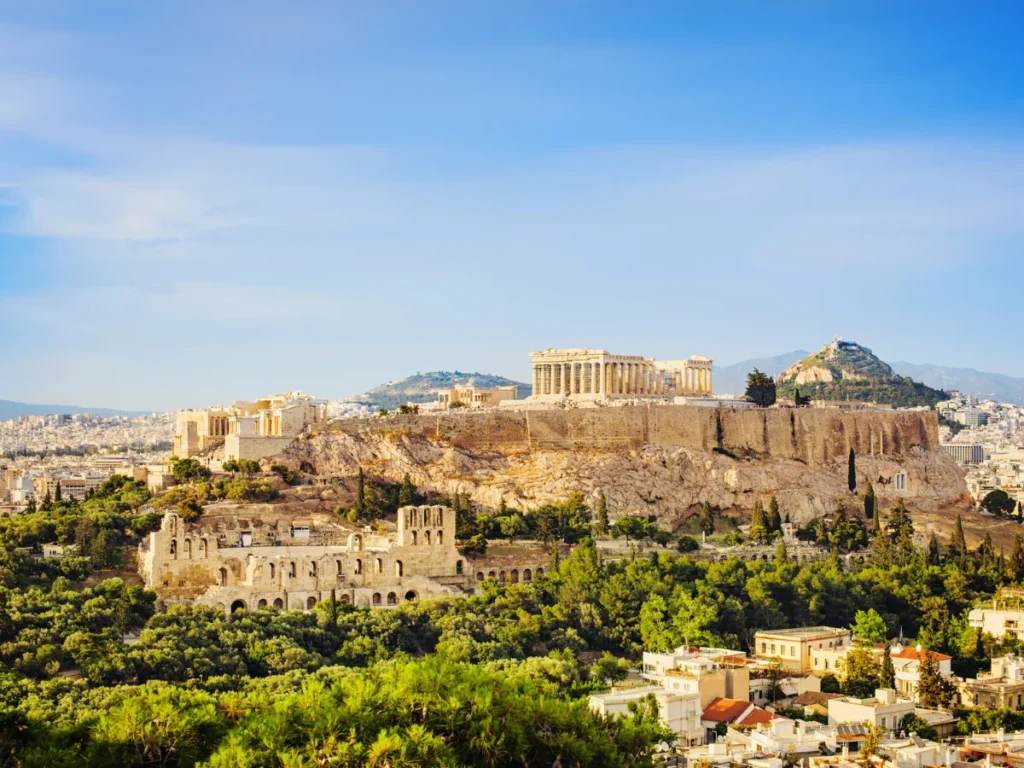
Democracy
Greece, the birthplace of democracy, boasts a rich history. Explore ancient ruins, beautiful islands, and vibrant culture. Enjoy sunny beaches, delicious cuisine, and warm hospitality year-round. Experience Greece’s unique charm.
Founding Figures
Greece, the birthplace of democracy, stands as a testament to the enduring legacy of self-governance. In the 5th century BCE, visionary leaders like Cleisthenes and Solon laid the foundation for a groundbreaking political system.
Institutions of Democracy
At the heart of Athenian democracy were its institutions. The Ekklesia, an assembly of citizens, convened to make crucial decisions. The Boule, a council of 500 citizens, proposed legislation and managed daily affairs.
Magistrates in Action
Within this democratic framework, magistrates played a vital role. The Archons, elected annually, held administrative and judicial responsibilities. The Polemarch Archon oversaw military matters, while the Thesmothetes ensured the rule of law.
Reforms that Shaped Democracy
Reforms over time refined the system. The reforms of Cleisthenes expanded citizen participation, ensuring equal representation across tribes and empowering the Ekklesia.
The Process of Voting
Citizens participated in voting through a show of hands, ballots, or the use of ostraka (pottery shards) to ostracize prominent figures. This democratic process allowed voices from all walks of life to influence the course of the city-state.
Greece’s democracy was a groundbreaking experiment that laid the foundation for modern governance. Its ideals continue to inspire nations worldwide, making Greece a must-visit for those seeking to explore the roots of democracy.
Odeon of Herodes
The Parthenon a top of Acropolis
The Parthenon
Ancient wonders
The ancient world marveled at the architectural and artistic prowess of Greece, home to five of the Seven Ancient Wonders. These incredible creations showcased human ingenuity and continue to inspire wonder and awe today.
1. The Statue of Zeus at Olympia:
A towering masterpiece by the Greek sculptor Phidias, this statue of Zeus, the king of the gods, was housed in the Temple of Zeus in Olympia. Its sheer size and intricate detail were awe-inspiring.
2. The Temple of Artemis at Ephesus:
The Temple of Artemis in Ephesus was a colossal structure dedicated to the goddess of the hunt. Its marble columns and exquisite artwork made it a symbol of architectural splendor.
3. The Mausoleum at Halicarnassus:
The Mausoleum at Halicarnassus was a monumental tomb built for Mausolus, a satrap of the Persian Empire. Its innovative architecture combined Greek and Lycian influences and set the standard for grand mausoleums.
4. The Colossus of Rhodes:
This colossal bronze statue of the sun god Helios once straddled the harbor of Rhodes. Its imposing presence and artistry made it a marvel of the ancient world.
5. The Lighthouse of Alexandria:
The Pharos of Alexandria, a towering lighthouse on the island of Pharos, was another Greek marvel. It guided sailors safely through treacherous waters with its towering flame.
These ancient wonders, a testament to Greek creativity and craftsmanship, continue to capture our imagination and remind us of the enduring legacy of Greece in the world of art and architecture.
Beautiful nature of Greece
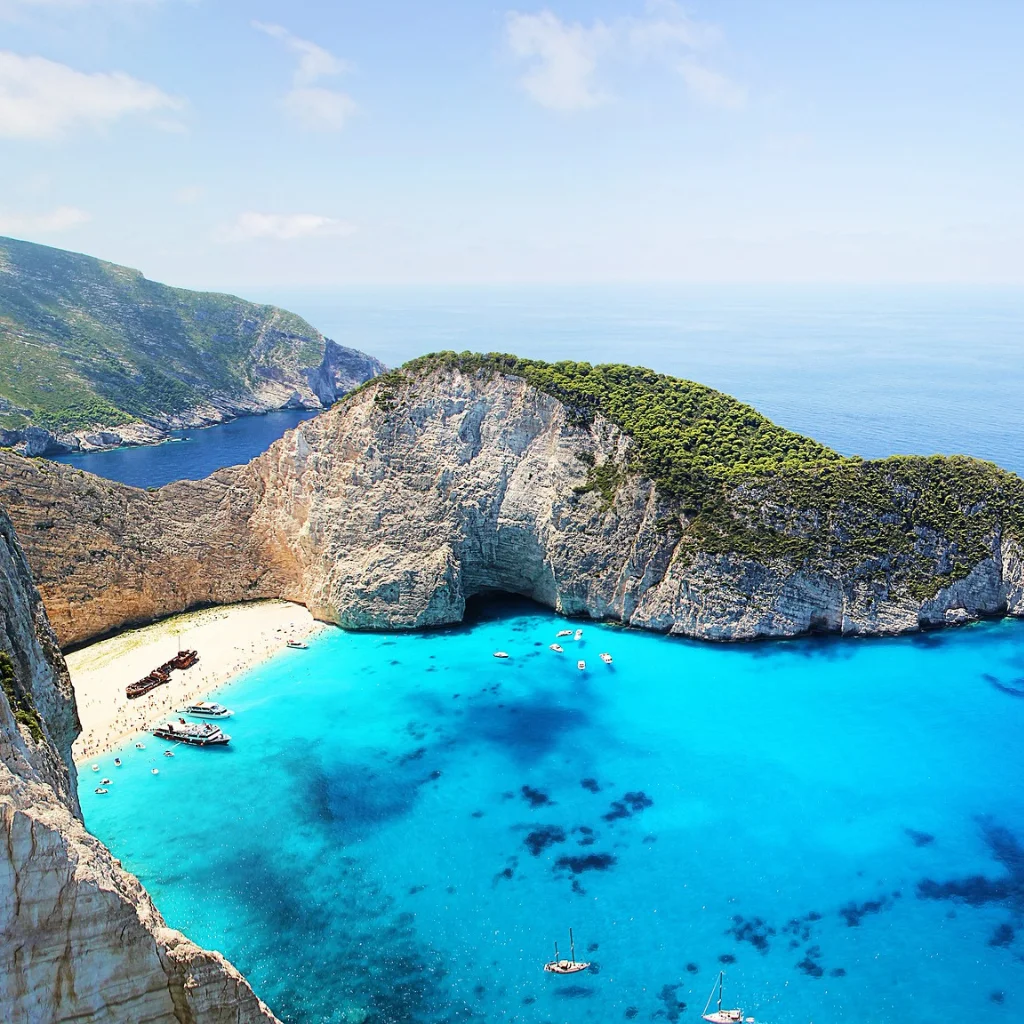
Beyond the Beaches: A Journey through Time
Beyond the pristine beaches, Greece offers a captivating journey through time. Explore ancient ruins like the Acropolis, where history comes to life. Wander through charming villages, savoring local cuisine and warm hospitality. Discover a land where myths and legends echo through centuries, inviting you to immerse yourself in Greece’s rich cultural tapestry.
Greece’s profound affinity for the sea is a captivating allure. With thousands of islands dotting the Aegean and Ionian Seas, it’s a maritime paradise. Crystal-clear waters, charming fishing villages, and endless opportunities for sailing and swimming make Greece an irresistible destination for sea lovers. Dive into Greece’s coastal beauty!

Battles
The Greco-Persian Wars
The Greco-Persian Wars, a defining chapter in ancient history, unfolded in the 5th century BCE. These wars arose as Greek city-states rallied together against the formidable Persian Empire’s expansionist ambitions. Key battles like the Battle of Marathon, where the Greeks showed exceptional valor, and the heroic defense at the Battle of Thermopylae, stand out. Themistocles’ strategic brilliance at the Battle of Salamis, fought at sea, turned the tide. Ultimately, the wars culminated in the Battle of Plataea, marking the end of Persian invasions in Greece. This epic struggle left an indelible mark on Greek identity and set the stage for the classical era.
The Greco-Roman Wars
The Greco-Roman Wars were a series of conflicts that occurred during antiquity between the Greek city-states and the Roman Republic and later the Roman Empire. These wars began with the Pyrrhic War in 280 BCE and continued through various campaigns, including the Macedonian Wars and the Roman conquest of Greece. The clash of these two ancient cultures had a profound impact on the development of the Mediterranean world, with Greek culture influencing Roman art, philosophy, and governance. Ultimately, Greece was absorbed into the Roman Empire, and this fusion of cultures played a pivotal role in shaping the history of Europe and beyond.
The Peloponnesian Wars
The Peloponnesian Wars were a protracted series of conflicts in ancient Greece, primarily fought between the city-states of Athens and Sparta along with their respective allies. These wars, which took place in the 5th century BCE, are divided into three phases: the Archidamian War, the Sicilian Expedition, and the Ionian or Decelean War. The main causes were power struggles, alliances, and the rivalry between Athens and Sparta. Ultimately, Sparta emerged as the victor, marking the end of the Golden Age of Athens and significantly altering the course of Greek history. Thucydides’ historical account remains a valuable source for understanding these conflicts.
More battles
Ancient Greece witnessed numerous wars that shaped its history. The Trojan War, a legendary conflict described in Homer’s epic poems, revolved around the siege of Troy and the abduction of Helen.
The Battle of Philippi, in 42 BCE, was a pivotal clash in the Roman Republic’s civil wars. Mark Antony and Octavian (Augustus) defeated Brutus and Cassius, leading to the end of the Roman Republic.
The Battle of Actium, in 31 BCE, marked the showdown between Octavian and Mark Antony. Octavian’s victory led to his ascent as the first Roman Emperor, ending the Roman Republic. These wars left indelible marks on the ancient world.
Gorgeous Beaches in Greece

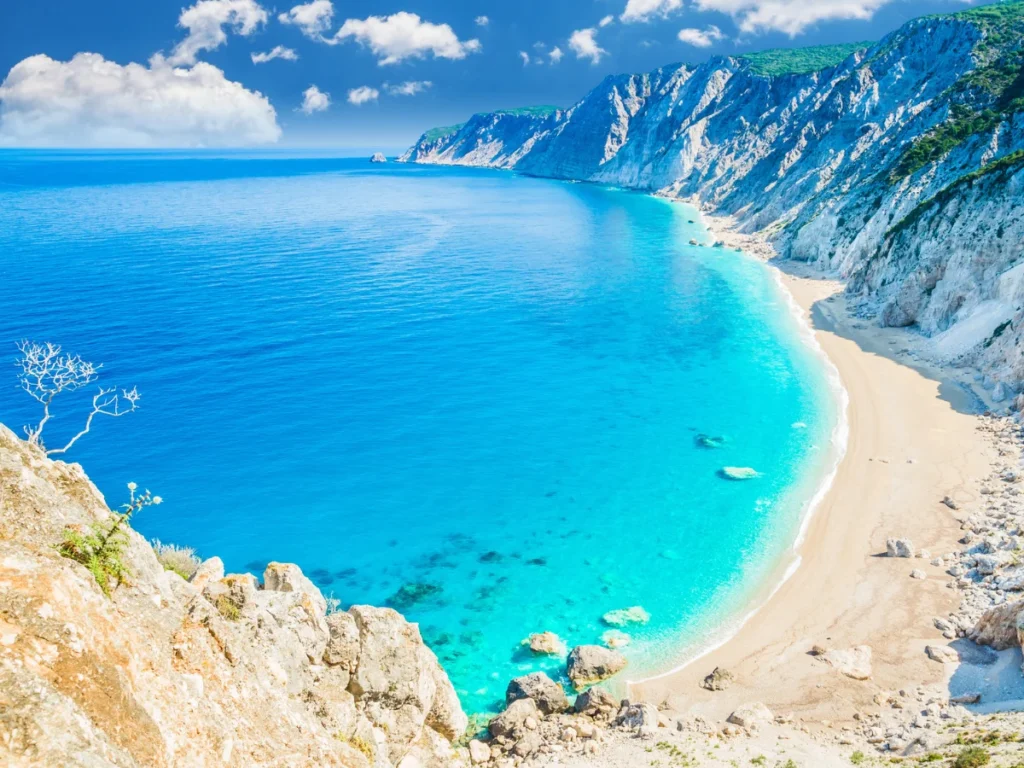

Famous people from Ancient Greece
Generals who where not Kings
Ancient Greece produced notable generals who weren’t monarchs but still left indelible marks on history. Epaminondas, the Theban strategist, revolutionized military tactics at the Battle of Leuctra. Pelopidas, his comrade, achieved heroic feats in Theban politics and warfare.
Aristides the Just, an Athenian, displayed exceptional leadership during the Greco-Persian Wars. Cimon, known for his naval prowess, expanded Athenian influence. Iphicrates, a skilled Athenian commander, introduced military innovations.
These non-royal generals demonstrated exceptional strategic brilliance, leaving an enduring legacy in the annals of ancient Greek military history.
Kings
Ancient Greece boasts a rich history of monarchs who left an indelible mark on the world. King Leonidas of Sparta became a symbol of bravery and sacrifice at the Battle of Thermopylae. Alexander the Great, hailing from Macedon, conquered vast lands, creating an empire that stretched from Greece to India. King Minos of Crete is a legendary figure, known for the enigmatic labyrinth.
Philosophers from Ancient Greece
Ancient Greece is renowned for its profound philosophical contributions, with philosophers who laid the foundations of Western thought. Socrates, often considered the father of philosophy, emphasized questioning and critical thinking.
Plato, his disciple, founded the Academy and delved into the nature of reality and ethics. Aristotle, another of Plato’s students, made significant strides in logic, ethics, and science.
Diogenes of Sinope, a Cynic philosopher, embraced a minimalist lifestyle to pursue truth. These philosophers’ ideas continue to shape philosophy, ethics, and intellectual discourse, leaving an enduring legacy in the annals of human thought.
Poets
Ancient Greece has left an indelible mark on the world of poetry, giving birth to legendary poets whose works resonate through the ages. Homer, a revered figure, authored the epic poems “The Iliad” and “The Odyssey,” which depict heroic adventures and the human condition.
Sappho, known for her lyric poetry, explored themes of love and desire. Pindar’s odes celebrated athletic victories, while Hesiod provided insights into Greek mythology through “Theogony” and “Works and Days.”
Euripides, a playwright-poet, enriched Greek drama with his tragedies. These poets’ words continue to captivate readers and inspire countless generations of writers and artists.
Politicians
In ancient Greece, prominent politicians left indelible marks on the political landscape. Solon, an Athenian statesman, enacted crucial reforms that laid the foundation for democracy and justice, setting the stage for a more equitable society.
Pericles, renowned for his eloquence and leadership, played a pivotal role in shaping Athens’ Golden Age. His visionary policies and inspiring speeches left a lasting legacy.
Cleisthenes, known as the “Father of Athenian Democracy,” introduced radical democratic reforms, including the concept of equal political participation for citizens. Together, these politicians left an enduring impact on ancient Greece, influencing the development of democracy and governance for centuries to come.
Famous Women from Ancient Greece
Ancient Greece saw remarkable women who made significant contributions to their society. Anyte of Tegea, an esteemed poetess, crafted beautiful epitaphs and elegies, celebrating life and nature through her verses.
Helen of Troy, though often remembered for her legendary beauty, was a complex figure whose story shaped the epic Trojan War, and her character’s portrayal in literature continues to fascinate.
Hydna of Scione, a talented swimmer and diver, displayed her remarkable abilities during the Greco-Persian Wars, aiding the Greek cause in clandestine naval missions. These remarkable women left their indelible marks on ancient Greece’s cultural and historical tapestry.
Famous Philosophers from Ancient Greece
History of religion in Greece
Religion in Greece is a multifaceted tapestry woven over millennia, reflecting the country’s rich history and cultural diversity.
Ancient Religion and Gods
In ancient Greece, religion played a central role in daily life. The Greeks believed in a pantheon of gods and goddesses led by Zeus, Hera, Athena, and many others. They built magnificent temples, such as the Parthenon, to honor these deities. Rituals, festivals like the Olympics, and sacrifices were common expressions of their faith. Oracle sites like Delphi were revered for their prophetic insights.
Judaism
The Jewish presence in Greece traces back to antiquity, with records of Jewish communities established in cities like Thessaloniki. They contributed to Greek society and maintained their religious practices and traditions. Unfortunately, during World War II, many Greek Jews fell victim to the Holocaust.
Christianity
Greece is significant in Christian history as the birthplace of several early Christian leaders, including the Apostle Paul. His journeys through Greece and the establishment of Christian communities had a lasting impact. Greece is dotted with stunning Byzantine churches, monasteries, and religious sites like Meteora, known for its monastic complexes perched on towering rock pillars.
Islam
Islam also has a historical presence in Greece, mainly through the Ottoman Empire’s rule. Regions like Thrace and the Dodecanese Islands have Muslim communities. The architecture and cultural influences of this period are still visible in places like Rhodes’ old town.
Today, Greece is a predominantly Christian Orthodox country, but it respects religious freedom and welcomes various faiths. The rich tapestry of religious history, from ancient beliefs to the spread of Christianity and the presence of other religions, continues to shape the cultural landscape of this remarkable nation.
City-states
Ancient Greece was a patchwork of independent city-states, each with its own unique character, government, and culture. Here are some of the most notable ones:
Athens
Athens, the cradle of democracy, was known for its intellectual and artistic achievements. Home to philosophers like Socrates and Plato, it valued education and the arts. The Parthenon, a symbol of ancient Greek architecture, graced the Acropolis.
Sparta
Sparta was a militaristic city-state where the Spartan warriors, known for their discipline and toughness, dominated society. Life in Sparta revolved around military training and service to the state.
Corinth
Corinth was a major trading hub, thanks to its strategic location between the Aegean and Ionian Seas. It was renowned for its wealth and prosperity, along with its distinctive architecture.
Thebes
Thebes was a powerful city-state that played a crucial role in Greek history. It was the birthplace of the famous general Epaminondas and the tragic myth of Oedipus.
Miletus
Miletus was a prominent center of philosophy and science. The philosopher Thales, considered one of the Seven Sages of Greece, hailed from this city.
Rhodes
Rhodes was a thriving maritime city-state, known for the Colossus of Rhodes, one of the Seven Wonders of the Ancient World.
Ephesus
Ephesus was a significant cultural and commercial center, boasting the Temple of Artemis, another of the Seven Wonders, and an impressive theater.
Megara
Megara was known for its contributions to philosophy and logic, with philosophers like Euclid and Eubulides originating from there.
Argos
Argos was one of the oldest city-states, with a rich mythological tradition and historical significance in the region.
These city-states often competed and occasionally cooperated, shaping the course of Greek history. They varied in governance, from oligarchies to democracies, and their distinct identities contributed to the diversity of ancient Greek culture. The interactions between these city-states, as well as their conflicts and alliances, created a dynamic and influential civilization that left an enduring legacy in the world.
Historical sites to visit in Greece
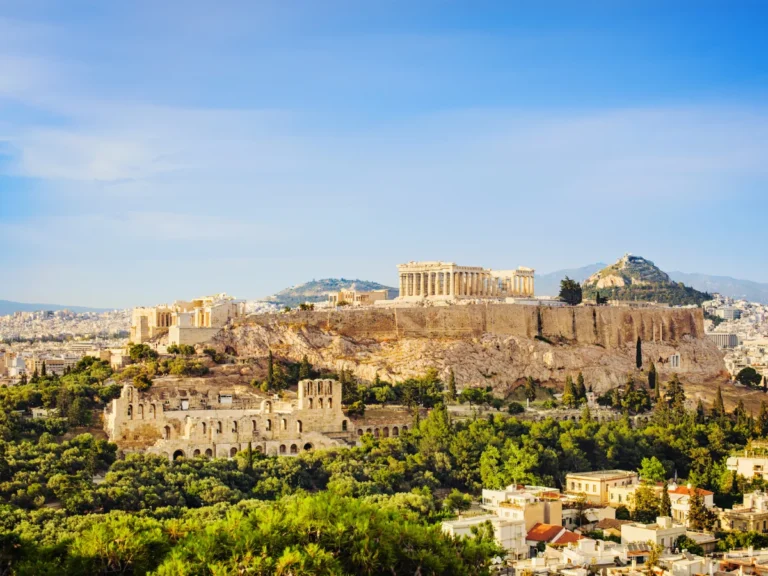
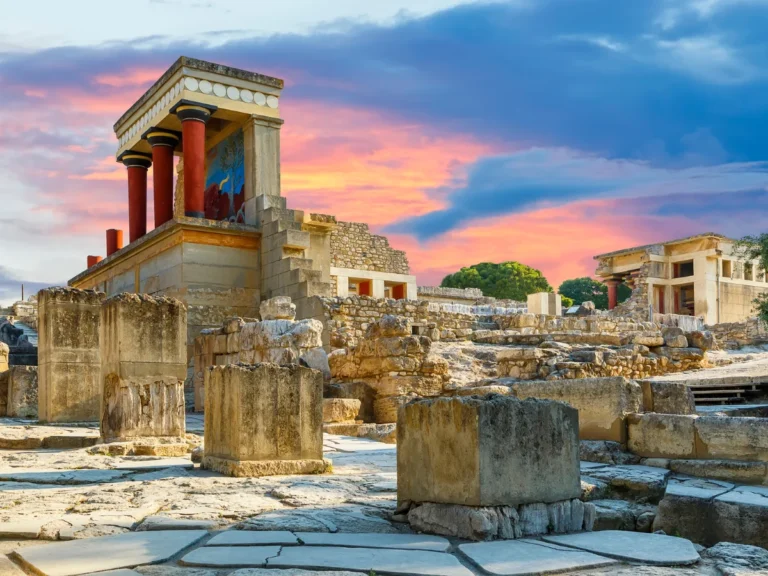
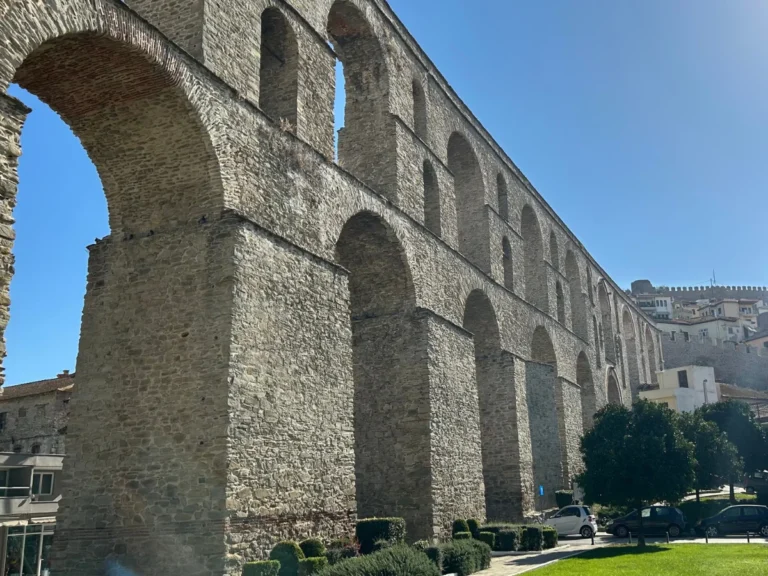
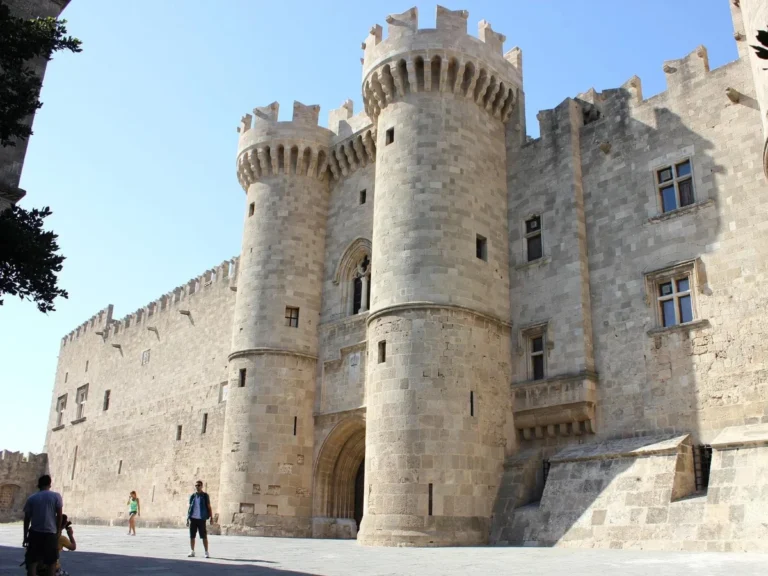
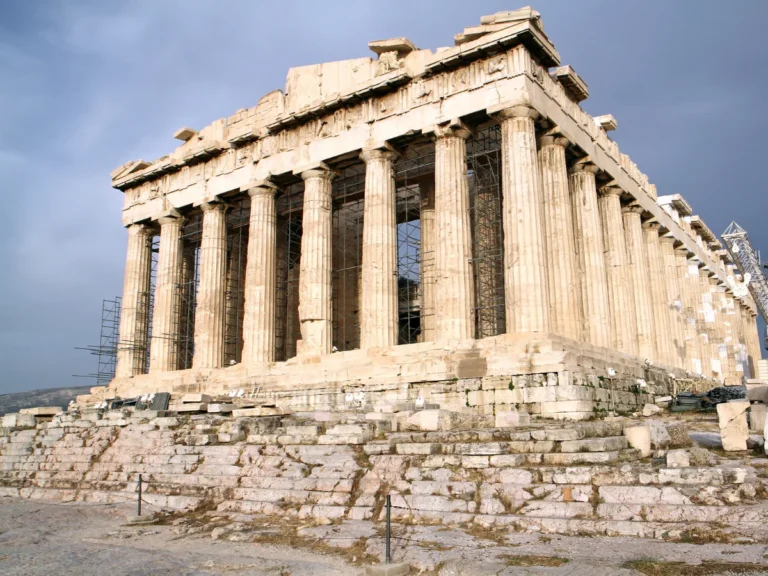
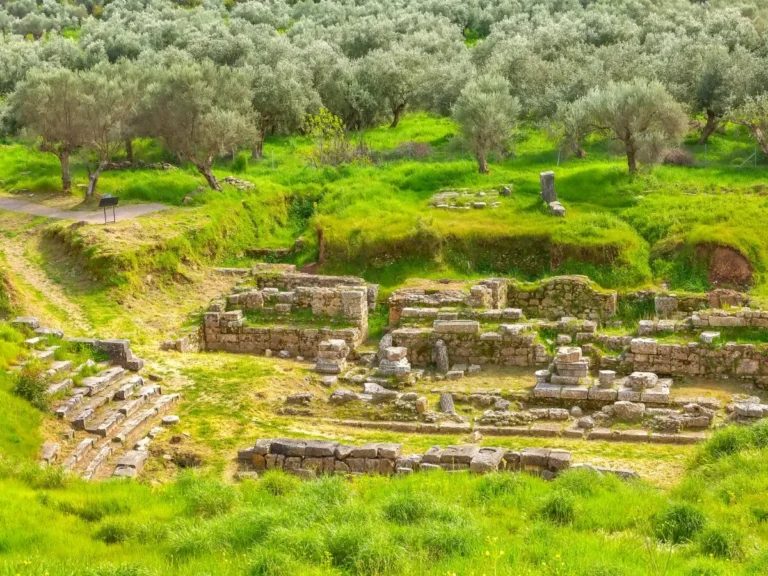
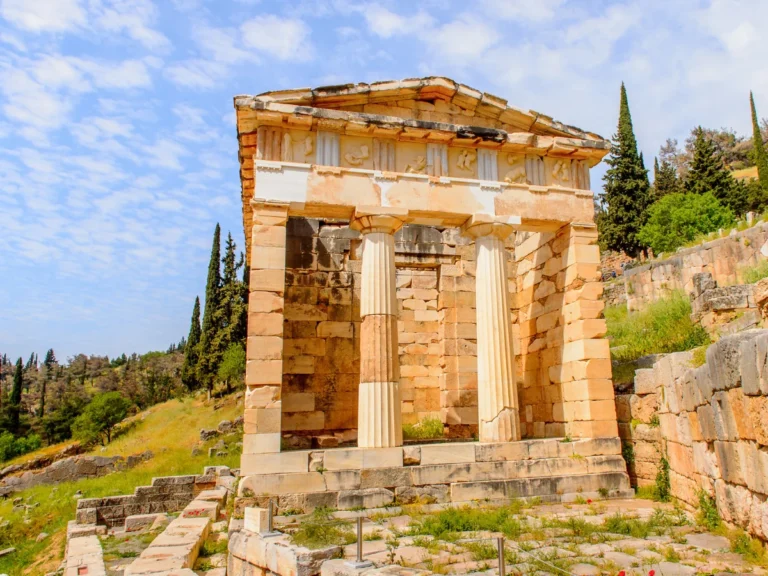
Greece is a treasure trove of historical sites. From the iconic Acropolis in Athens to the ancient city of Delphi, these sites offer a glimpse into the rich history of Greece. Explore the ruins of Olympia, the birthplace of the Olympic Games, or wander through the archaeological wonders of Mycenae and Epidaurus. With a history dating back thousands of years, Greece’s historical sites are a testament to its enduring cultural legacy.
More history of Greece
Knowledge
Ancient Greece was a cradle of knowledge and innovation. In philosophy, luminaries like Socrates, Plato, and Aristotle laid the foundations for critical thinking and ethics. Mathematicians like Pythagoras and Euclid made profound contributions, while astronomers like Hipparchus expanded our understanding of the cosmos.
Greek architecture, with iconic structures like the Parthenon, showcased their engineering prowess. Their innovation in engineering included inventions like the screw pump, vital for irrigation and construction. This ancient civilization’s knowledge and wisdom continue to influence and inspire modern thought and progress across various fields.
The Greek Language
The history of the Greek language is a fascinating journey through time. Its alphabet, originating in the 8th century BCE, became the foundation for many other writing systems. Greek has various dialects, including Attic, Ionic, and Doric, each with unique characteristics.
Greek literature boasts epic poems like the Iliad and the Odyssey by Homer, laying the groundwork for storytelling. Great playwrights like Aeschylus, Sophocles, and Euripides produced timeless tragedies and comedies. The New Testament of the Bible was written in Koine Greek, influencing Christian theology.
Today, Greek remains a living language with a rich history, connecting the past with the present.
Other Empires who ruled Ancient Greece
In the tapestry of Ancient Greece’s history, various empires have left their mark. The Minoans, thriving on Crete around 3000 BCE, laid the foundation for Greek civilization. The Roman Empire’s conquest of Greece in the 2nd century BCE brought immense cultural influence, fostering Hellenistic traditions.
The Byzantine Empire, established after the Roman Empire’s fall, preserved Greek heritage through the Middle Ages, with Byzantium (modern-day Istanbul) as its capital. Later, the Venetian Empire exerted control over Greek islands during the Middle Ages and Renaissance.
These empires contributed to Greece’s complex historical narrative, shaping its culture, architecture, and traditions.
Learn more history of Greece through many of our posts
Explore popular Destinations in Greece
Events in Greece
Explore Greece
Discover Greece's stunning natural beauty – from pristine beaches and azure seas to lush mountains and charming villages. Paradise awaits!
Explore Greece's iconic destinations, from the ancient wonders of Athens to the serene beaches of Santorini. Your Greek adventure awaits!
Discover Greece's enchanting islands, including Rhodes, Mykonos, and Corfu. Each offers a unique blend of history, culture, and natural beauty.
Unearth Greece's hidden gems, where pristine beaches, charming villages, and rich history await your discovery. Dive into the unknown beauty.
Experience diverse activities, from exhilarating water sports in crystal-clear seas to hiking ancient trails where history whispers through ruins.
Explore Greece's historical cities, where ancient ruins and timeless charm converge. Walk in the footsteps of legends and embrace history.






